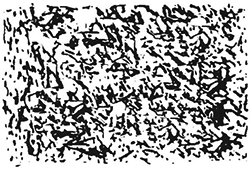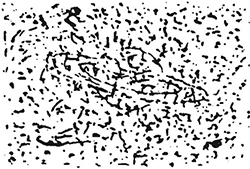Cultivate Your Garden
How a lack of control leads to superstition
and what can be done about it

Imagine a time in your life when you felt out of control—anything from getting lost to losing a job. Now look at the Figure 1 on this page. What do you see? Such a scenario was presented to subjects in a 2008 experiment by Jennifer Whitson of the University of Texas at Austin and her colleague Adam Galinsky of Northwestern University . Their study, entitled “Lacking Control Increases Illusory Pattern Perception,” was published in Science.
Defining “illusory pattern perception” (what I call “patternicity”) as “the identification of a coherent and meaningful interrelationship among a set of random or unrelated stimuli … (such as the tendency to perceive false correlations, see imaginary figures, form superstitious rituals, and embrace conspiracy beliefs, among others),” the researchers’ thesis was that “when individuals are unable to gain a sense of control objectively, they will try to gain it perceptually.” As Whitson explained the psychology to me, “Feelings of control are essential for our well-being—we think clearer and make better decisions when we feel we are in control. Lacking control is highly aversive, so we instinctively seek out patterns to regain control—even if those patterns are illusory.”

Figure 1
Whitson and Galinsky sat subjects before a computer screen, telling them that they would be presented with a series of images for which they were to determine the underlying concept. For example, they might see a capital A and a lowercase a, one or both of which could be colored, underlined, or surrounded by a circle or square. Subjects would then generate an underlying concept, such as that all capital As are red or surrounded by a circle. There was no actual underlying concept—the computer randomly combined characteristics and was programmed to tell the subjects that they were frequently either “correct” or “incorrect.” Consequently, the ones hearing that they were often wrong developed a sense of lacking control. In the second part of the experiment subjects were shown 24 “snowy” photographs, half of which contained hidden images such as a hand, horses, a chair or the planet Saturn [see Figure 2], whereas the other half just consisted of grainy random dots. Although nearly everyone saw the hidden figures, subjects in the lack-of-control group saw more figures in the photographs that had no embedded images.

Figure 2
In another experiment Whitson and Galinsky had subjects vividly recall an experience in which they either had full control or lacked control over a situation. The subjects then read scenarios in which the characters’ success or failure was preceded by unconnected and superstitious behaviors, such as foot stomping before a meeting where the character wanted to have ideas approved. The subjects were then asked whether they thought the characters’ behavior was related to the outcome. Those who had recalled an experience in which they lacked control were significantly more likely to perceive a greater connection between the two unrelated events than were those who recalled a controlling situation. Interestingly, the low control subjects who read a story about an employee who failed to receive a promotion tended to believe that a behind-the-scenes conspiracy was the cause.
In their final experiment Whitson and Galinsky gave one group of subjects a sense of control by asking them to contemplate and affirm their most important values in life—a proven technique for reducing learned helplessness. The researchers then presented those same snowy pictures, finding that a comparison group of subjects in a lack-of-control condition with no opportunity for self-affirmation saw more nonexistent patterns than did those in the self-affirmation condition.
In 1976 Harvard psychologist Ellen J. Langer and Judith Rodin, now president of the Rockefeller Foundation, conducted a study in a New England nursing home in which the residents were given plants, but only some had the opportunity to water them. Those residents who were in charge of watering the plants lived longer and healthier lives than the others, even those given plants watered by the staff. The sense of control had the apparent effect on physical health and well-being. Perhaps this is what Voltaire meant at the end of Candide, in the title character’s rejoinder to Dr. Pangloss’s proclamation that “all events are linked up in this best of all possible worlds”: “’Tis well said,” replied Candide, “but we must cultivate our gardens.”
(Illustrations copyright 2010 Matt Collins)


February 10th, 2010 at 2:01 am
For the lay public there is no control over the predetermined future and hence does it lead to superstition of God, so that all successes can be attributed to God and failures to either bad luck or insufficient belief in GOD.
February 10th, 2010 at 2:56 pm
Rajesh Kher Says: “insufficient belief in GOD”
Why a singular God, Rajesh?
There are lots of them out there . . . .the more the merrier.
February 13th, 2010 at 8:01 am
Many people joins cults/religions when they have recently gone though an emotionally difficult time, such as a separation from a spouse, death of a loved one, loss of job, move to a different location. And at times of high physical/emotional distress people are more likely to experience hallucinations, which may encourage belief in the supernatural.
February 16th, 2010 at 7:22 am
‘hidden images such as a hand, horses, a chair or the planet Saturn’
The weakness in this study (and in scientific approaches to apophenia in general) is the assumption that sensory data has inherent ‘meaning’.
In figure 2, the assumption is that we are ‘meant’ to see Saturn – that there is a ‘right’ answer. The fact that the data may have been derived from a degraded photo of ‘Saturn’ is irrelevant – it could have been randomly generated as far as the viewer is concerned.
Anyone seeing a paperclip and a coin are dismissed as ‘wrong’, as seeing something ‘illusory’.
March 10th, 2010 at 5:08 am
Aww… I saw dragons in figure 1. Several of them. Come on, you know that’s gotta mean something!!! Tell me it means something, oh Great Reader of Minds and Meanings who knows what I am thinking and meaning by what I see in nothing!!!
My thought on this is that the “publish or perish” atmosphere at universities is what keeps research like this showing up in magazines. If psychology PhD’s and doctoral candidates want to keep their jobs, they’ve gotta come up with something for their papers that grabs attention and sounds intriguing and maybe gives insight into the “human condition.” That, and the need for grant money to keep going and eventually win tenure.
Pardon me if my world isn’t changed by this. I once saw the face of christ in a pattern in the plywood door of a bathroom stall in a filling station. On the inside of the door, facing the toilet. That’s gotta mean something profound, too, doesn’t it? Maybe I should have stolen the door and sold it on Ebay, I could be rich.
March 26th, 2010 at 1:54 pm
Where is your Mar 2010 Article?
April 6th, 2010 at 2:13 pm
I have a fairly superstitious co-worker who came to mind while I was reading this article. Our many conversations often have a theme of lack of control in them. I will continue our conversations with a a new way to look at them.
April 9th, 2010 at 1:59 pm
An overlooked detail is that all studies do not reveal information, they require interpretation. Interpretation is everything. The pattern recognition mechanisms of mind are not observable ordinarily, so the mind creates or tries to create some sense from whatever has come to attention. The mind itself is what strives to seek meaning. When the mind cannot find some familiar point of reference in the past, it’s in a ‘no compute’ state, and that causes confusion, not necessarily a loss of control. Ex: I began to notice license tabs and noticed an attempt to make sense of the jumbled letters and numbers. It was bothersome, tedious and useless I thought. I couldn’t control the impulse or whatever it was, it kept noticing license tabs. Then one day I chanced to notice DJWANNA on a tab. Do You Want To? obviously. I had just said my name was ju-anna when that happened. Meaningful coincidence? Perfect timing? When a pattern like that continues, how will science interpret it when one incident isn’t enough? I watched the debate: Does God Have A Future. Your attitude was not unbiased, detached and respectful, in my opinion.